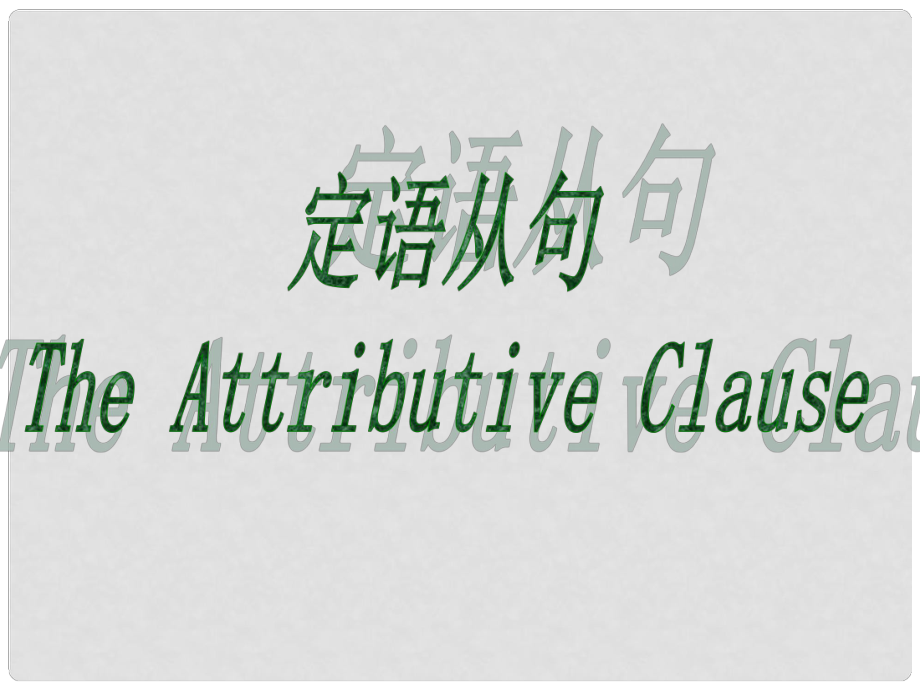《高三英語:Unit3 Planning for the perfect weddinggrammar課件(1)(牛津上海版S3A)》由會員分享�����,可在線閱讀�����,更多相關(guān)《高三英語:Unit3 Planning for the perfect weddinggrammar課件(1)(牛津上海版S3A)(29頁珍藏版)》請在裝配圖網(wǎng)上搜索�����。
1、定義定義:定語從句是起定語作用定語從句是起定語作用, ,修飾名修飾名詞或代詞的從句���。被修飾的名詞或代詞的從句���。被修飾的名詞或代詞稱為先行詞。定語從詞或代詞稱為先行詞�����。定語從句一般位于先行詞后�����。定語從句一般位于先行詞后�����。定語從句往往用關(guān)系副詞和關(guān)系代詞句往往用關(guān)系副詞和關(guān)系代詞引導(dǎo)�����,關(guān)系詞在定語從句中擔(dān)引導(dǎo)��,關(guān)系詞在定語從句中擔(dān)任某種成分。任某種成分��。1.Is he the man who(that) wants to see you?2.The number of people who(that) were killed or injured reached more than 400,000
2����、.3.The army organized teams to dig out those who(that) were trapped and to bury the dead.4.He is the man whom(that/who) I saw yesterday. 1.Your speech was heard by a group of five judges, all of whom agreed that it was the best one this year.2.A huge crack that(which) was eight kilometers long and t
3、hirty meters wide cut across houses, roads and canal.3.Do you like the book that(which) you borrowed yesterday?4.Please pass me the book whose cover is green. 5.Workers built shelters for survivors whose homes had been destroyed.USAGES 關(guān)系代詞關(guān)系代詞指人做主語��,指人做主語���, WHO與與THAT的區(qū)別的區(qū)別一般情況都可以互換�,但在下列情況下一般情況都可以互換�,但
4、在下列情況下A.只用只用who不用不用that1. 當(dāng)先行詞是當(dāng)先行詞是those,she,he they,one(s),anyone等代詞時���。等代詞時。2. 一個從句中有兩個定語從句�,其一個從句中有兩個定語從句,其中一個是中一個是that�����,另一個用�����,另一個用who。3. 當(dāng)先行詞有較長的定語時�,用當(dāng)先行詞有較長的定語時,用who����。4. 主句以主句以 there be 引導(dǎo)引導(dǎo) B. 只用只用that不用不用who1. 先行詞是先行詞是who,或��,或who引導(dǎo)引導(dǎo)的主句�。的主句。2. 先行詞在定語從句中做表語先行詞在定語從句中做表語 e.g. She isnt the girl that sh
5��、e was 10 years ago.指人做主語��,指人做主語�����, WHO與與THAT的區(qū)別的區(qū)別指物做主語�,指物做主語,whichwhich和和thatthat的區(qū)別的區(qū)別一般情況都可以互換�����,但在下列情況下一般情況都可以互換,但在下列情況下A.A.只用只用thatthat不用不用whichwhich1.1.先行詞是形容詞最高級��,或被最高級先行詞是形容詞最高級�,或被最高級修飾時修飾時2.2.先行詞是序數(shù)詞,或被序數(shù)詞修飾時先行詞是序數(shù)詞�����,或被序數(shù)詞修飾時3.3.主句已有疑問詞主句已有疑問詞whichwhich時時4.4.先行詞既有人又有物時先行詞既有人又有物時5. 先行詞是先行詞是all, muc
6�、h, little, something, everything, anything, nothing, none, the one 等代詞時等代詞時6. 先行詞被先行詞被only, any, few, little, no, all, one of, the same, the very等修飾時等修飾時7. 有兩個定語從句,其中一個用有兩個定語從句�,其中一個用which, 另一個用另一個用that指物做主語,指物做主語�����,WHICH和和THAT的的區(qū)別區(qū)別B. 只用只用which不用不用that1.非限制性定語從句非限制性定語從句2.限制性定語從句限制性定語從句 (1)關(guān)系詞前有介詞)關(guān)系詞前
7���、有介詞 (2)如果有兩個定語從句�,其中一個)如果有兩個定語從句����,其中一個 用用that�,另一個用����,另一個用which做賓語時����,往往可以省略做賓語時,往往可以省略但是做介詞的賓語�����,且介詞提前�����,但是做介詞的賓語����,且介詞提前,即結(jié)構(gòu)是即結(jié)構(gòu)是“介詞介詞+關(guān)系代詞關(guān)系代詞”時時指物只能用指物只能用which�,指人只能用,指人只能用whom1.Mandela was the black lawyer to whom I went for advice.2.He was generous with his time, for which I was grateful.3.The parts of town
8��、 in which they had to live were decided by white people.定語從句的辨認(rèn)與使用定語從句的辨認(rèn)與使用 思考步驟:思考步驟: (1)找出先行詞)找出先行詞 a.確定關(guān)系代詞的人稱�����、數(shù)和性確定關(guān)系代詞的人稱、數(shù)和性 b.確定從句位置(一般在先行詞之后)確定從句位置(一般在先行詞之后) (2)確定關(guān)系代詞在從句中所擔(dān)任的成)確定關(guān)系代詞在從句中所擔(dān)任的成 (3)確定從句時態(tài))確定從句時態(tài)引導(dǎo)定語從句的關(guān)系副詞有引導(dǎo)定語從句的關(guān)系副詞有WHEN,WHERE與與WHYwhen表示時間表示時間,其先行詞往往是表示時其先行詞往往是表示時間的名詞間的名詞(如
9�、如day,hour,year,date等等)。where表示地點����,其先行詞往往是地點表示地點,其先行詞往往是地點名詞(如名詞(如place,house,street,area等等)����。why表示原因,常用在先行詞表示原因��,常用在先行詞reason后����。后。關(guān)系副詞在定語從句中做關(guān)系副詞在定語從句中做狀語狀語1.The time when I first met Nelson Mandela was a very difficult period of my life.2.The school where I studied for only two years was three kilometr
10��、es away.3.This was a time when one had got to have a passbook to live in Johannesburg.4.The day when Nelson Mandela helped me was one of my happiest.5.We have reached a stage where we have almost no rights at all.是不是見先行詞是表時間是不是見先行詞是表時間-when-when 先行詞是表地點先行詞是表地點- where- where 先行詞是先行詞是reason-reason-why
11�����、-why1. The reason _ she gives for not coming to the party is that her mother wont let her. A. why B. which 2. Is that the house _ you bought last year? A. where B. which填空:填空:1. Look at that lady _ name is Pochi.2. He is a teacher _ I like very much.3. Those pictures _ were drawn by Tom are nice.4.
12�����、Those _will go to the park stay here.5. That was all the money _I had.whose whom/thatwhich/that whothat6. Tom is the first boy _ left the room.7. Look at the boy and his dog _are coming this way.8. You can read any book _I have.9. That was the year _I went to America.10. we came to the town, _we sta
13���、yed for 2 hours.who/thatthatthatwhenwhere基礎(chǔ)練習(xí)基礎(chǔ)練習(xí)1. Is that the house _ you bought last year? A. where B. which2. Is that the picture _ you are laughing at? A. which B.where3. It is the most interesting book _Ill ever read. A. which B. thatBBA4.The street _is to the park is very narrow. A. where B.
14��、which5.The person _finds my watch will get a reward. A. who B. when6.This is the room _ we listened to the lecture. A. which B. whereBAB7.The boy _mother is ill can not come to the party.A. who B. whose8.Tell me the reason _ you are late.A. which B. whyBB1. The man _ I saw told me to wait.2. The man
15�����、 to _ I spoke was a foreigner.3. I know a boy _ father is an acrobat. (雜技演員雜技演員)4. He saw a house _ windows were all broken.Fill in the blanks with who, whom, whose, which and that.whowhomwhosewhose5. All the apples _ fall are eaten by wild boars.6. Can you think of anyone _ could look after him?7.
16�、This is the best hotel _ I know.8. He showed a machine _ parts are too small to be seen.thatthatthatwhich1.This is all_I know about the matter. A.that B.what C.who D.whether2.Is there anything else_you want? A.which B.that C.who D.what3.The last place _we visited was the Great Wall. A.which B.that C
17��、.where D. itChoose the best answers:4. Please take the second chair_is over there. A. where B. which C. who D. that 5.Is oxygen the only gas _ helps fire burn? A. that B./ C.which D.it 6.Finally, the thief handed everything _ he had stolen to the police(NMET98) A. which B. what C. whatever D. that 7
18�����、. All of the flowers now raised here have developed from those _ in the forest. A. once the grew B. they grew once C. that once grew D. once grew.8. I dont like _ you speak to her. A. the way B. the way in that C. the way which D. the way of which9. The weather turned out to be very good, _ was more than we expected. A. what B. which C. that D. it10. He paid the boy $10 for washing ten windows; most of _ hadnt been cleaned for ten years. A. these B. those C. that D. which
 高三英語:Unit3 Planning for the perfect weddinggrammar課件(1)(牛津上海版S3A)
高三英語:Unit3 Planning for the perfect weddinggrammar課件(1)(牛津上海版S3A)

